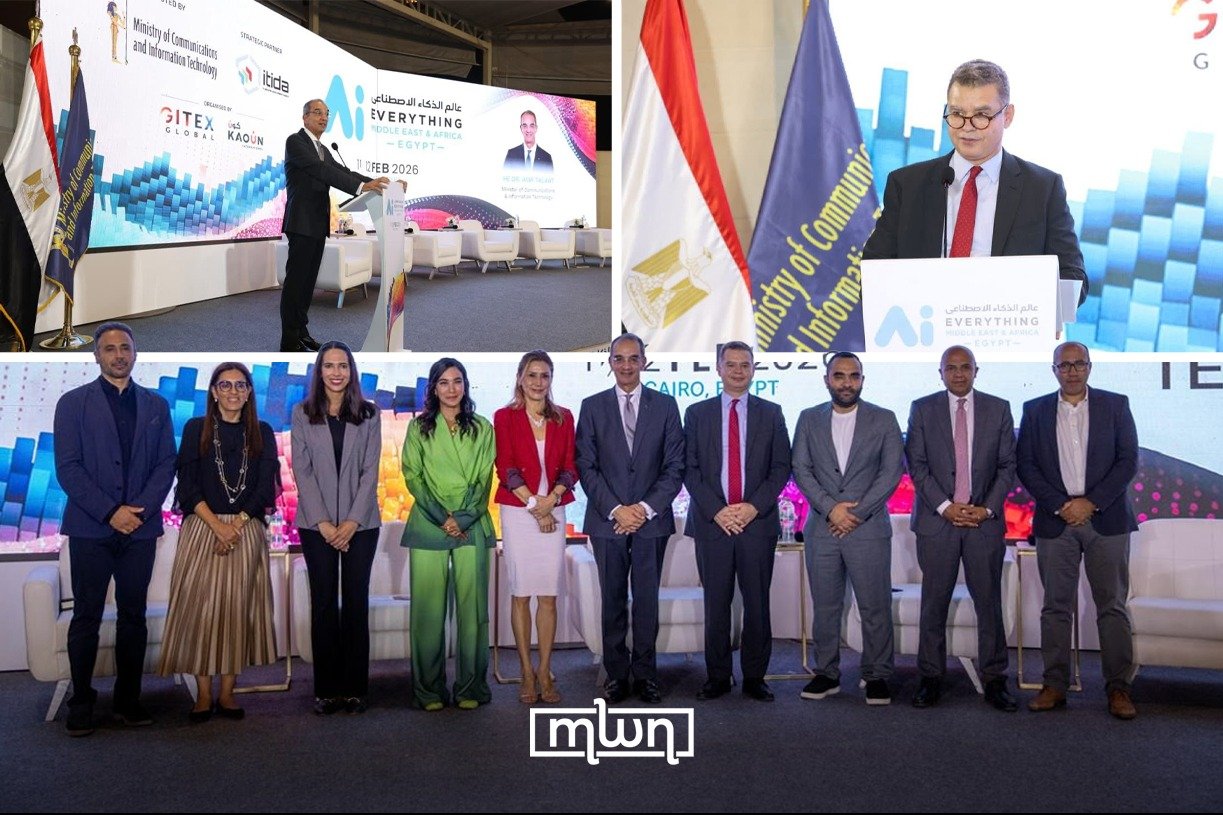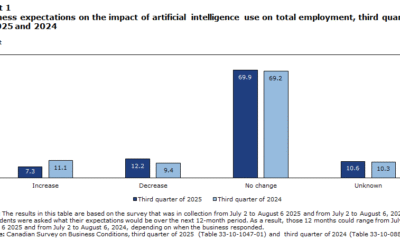Tools & Platforms
GITEX GLOBAL Brings Global AI Leaders to Egypt Ahead of Ai Everything MEA 2026

Mohammedia – Egypt has taken a major step in its AI journey with an exclusive launch event for Ai Everything Middle East & Africa Egypt at the historic Sultan Hussein Kamel Palace in Cairo.
The event, organised by GITEX GLOBAL and hosted by Egypt’s Ministry of Communications and Information Technology (MCIT) in partnership with the Information Technology Industry Development Agency (ITIDA), brought together senior government officials, global tech executives, AI innovators, media, and startup representatives.
The launch sets the stage for the main event, Ai Everything MEA Egypt 2026, scheduled for 11-12 February 2026.
The event showcased Egypt’s goal of generating $42.7 billion in annual AI value by 2030 and establishing Cairo as a hub for global AI collaboration. Discussions focused on how Ai Everything MEA Egypt includes international expertise and Egypt’s National AI Strategy 2025-2030.
Many of Egypt’s strengths in the tech industry were highlighted as key advantages for growing its AI ecosystem: outsourced digital services, semiconductors, electronic design, public sector transformation, startup innovation, and attracting global investments.
Eng. Ahmed Elzaher, CEO of ITIDA, opened the event by emphasizing that, “AI today is no longer a trend; it is a core driver of economic and societal transformation. Hosting Ai Everything MEA Egypt is part of Egypt’s mission to remain at the forefront of the global technology revolution. This summit cements our position as a regional hub for innovation and trusted global partner in the AI era.”
Trixie LohMirmand, EVP of Dubai World Trade Centre and CEO of KAOUN International, added “AI will be the backbone of Egypt’s economic transformation.”
“Our goal with Ai Everything MEA is to empower both the public and private sectors, as well as young talent and startups, to shape the country’s AI future,” she continued.
Egypt’s Minister of Communications and Information Technology, H.E. Dr. Amr Talaat, noted that the country’s selection to host Ai Everything MEA Egypt reflects international recognition of Egypt’s progress in artificial intelligence.
“Since launching our first National AI Strategy in 2019, Egypt has advanced 46 places in the global AI Readiness Index,” he said.
“The updated strategy focuses on six pillars, including wider access to computing resources, stronger data governance, AI systems to boost growth, digital skills, public awareness, and a solid regulatory framework,” he added.
Read Also: Founders, Innovators Put Africa’s Tech Future on Full Display at GITEX Nigeria 2025
The launch also featured a panel discussion on “Egypt’s AI Future,” with leaders from IBM, HPE, Deloitte Innovation Hub, WideBot AI, Intella, and Plug & Play Tech Centre. Speakers shared insights on scaling startups, improving public-private partnerships, and raising Egypt’s global competitiveness in AI.
Marwa Abbas from IBM highlighted how AI tools like IBM watsonx are helping Egyptian businesses accelerate digital transformation, while HPE’s Mohamed Wasfy noted that Egypt now hosts some of the world’s most energy-efficient AI systems.
CEOs of Egyptian AI startups, including WideBot AI and Intella, discussed recent funding successes and strategies to grow their businesses internationally.
Ai Everything MEA Egypt 2026, taking place at the NCIEC in Cairo, will host AI experts, startups, investors, policymakers, and global enterprises from 60 countries.
The event features discussions on next-generation AI infrastructure, responsible scaling, semiconductors, cybersecurity, digital health, fintech, and startup-investor networking. It aims to attract global investment and reinforce Cairo as the Middle East and Africa’s AI innovation center.
Tools & Platforms
SpamGPT Is the AI Tool Fueling Massive Phishing Scams

How Does SpamGPT Work?
SpamGPT works like any email marketing platform. It offers tools like SMTP/IMAP email server, email testing, and campaign performance monitoring in real time. There’s also an AI marketing assistant named KaliGPT, which is built directly into the dashboard for assistance.
However, where it differs from email marketing platforms is that it is specifically designed for creating spam and phishing emails to steal information and financial data from users.
More specifically, SpamGPT is “designed to compromise email servers, bypass spam filters, and orchestrate mass phishing campaigns with unprecedented ease,” according to a report from Varonis, a data security platform.
Tools & Platforms
AI-Enabled Technology Automates and Optimizes Airport Parking Systems

Vehicle parking accounts for the top source (24%) of non-aeronautical revenue at airports, ahead of retail concessions, real estate investments, and rental car fees, according to the Airports Council International.
At the same time, aging parking access and revenue control equipment like ticket machines and pay stations fail regularly after years of operation. This results in operational cost increases, potential revenue leakage from downtime, and negative impacts on customer satisfaction due to traffic build up at entry and exit. For busy airport executives, these issues are easy to overlook and not prioritize because parking revenue is predictable and significant. However, those who do prioritize parking can quickly find a meaningful area of value creation in terms of revenue and customer experience improvement.
Artificial intelligence (AI) can help airport executives realize this untapped value by transforming airport parking into a hands-off operation that is always on, never breaks down, is more accurate and financially accountable, and provides a better parking experience for airport customers.
AI-enabled parking management systems can improve conditions for operational and landside managers by eliminating the need to:
● Schedule and pay staff to operate payment booths.
● Schedule and pay maintenance and repair staff for traditional fee-collection ticket machines and kiosks.
● Reroute parking traffic when lanes unexpectedly need to close or back up from slow operation.
For airport executives and managers, AI can provide better predictability and control of parking revenue through more accurate vehicle and fee identification. It can also replace electromechanical fee-collection machines and kiosks, which disrupt automatic collections and require significant labor expense when they break down.
In addition, AI has the power to attract more airport parkers by automating every aspect of airport parking — from reserving a spot to paying — consistently and reliably.
How does an AI-enabled parking system work?
An AI-enabled parking system works by creating a digital fingerprint of each vehicle that includes necessary data about the vehicle. Combined hardware and software identify the vehicle instantly via its digital fingerprint as it approaches a parking facility, prompting actions that enable the driver to enter, exit, and pay without stopping. Vehicle identification, fee calculation, and the payment transaction all happen in the background, without intervention from drivers or airport staff.
Dayton International Airport, San Antonio International Airport, Northwest Arkansas National Airport, and Aspen/Pitkin County Airport all recently adopted the Metropolis for Airports AI-enabled modern parking system.
It’s an upgrade that is paying off at Dayton International Airport (DAY): Growing popularity and consistently reliable collections have lifted in-plane revenue per passenger from $10 to $13.14.
“It makes [parking] seamless for our customers,” Gil Turner, Director of DAY, says of Metropolis. “They just drive up. They don’t have to roll the window down. They pull up, the system recognizes the vehicle, takes the license plate information, and they’re able to go right in and park. And when they leave, there’s no interaction with the booth person. So it’s all great. I know that flying can be a frustrating process, so when you have a system, you come home, you can just leave and don’t have to have any stress or worries. I mean, it just helps the customer.”
The Metropolis system runs in the cloud and uses computer vision, license plate recognition (LPR), camera-based hardware, machine learning, and AI to automate parking events, as well as parking data collection. The system requires no upfront capital investment from airports and integrates with existing gate equipment.
A driver registers once and is ready to go. Here’s how it works:
● When a car enters the lot, the computer vision-enhanced camera captures the license plate. Intelligent software then recognizes the car as a Metropolis user and prompts the entry gate.
● When the car leaves, the system again recognizes the license plate, calculates the fee, charges the driver’s selected payment method, and prompts the exit gate to open.
● The system automatically sends a receipt to the driver via email or text.
● Data on the parking event is stored and made available.
In addition to automation benefits, AI-enabled parking systems provide real-time data that is highly valuable for more informed staffing, lane management, and lot maintenance planning. This data can also help airport managers and directors respond to customer input and demand in real time, such as instituting dynamic pricing.
And as an intelligent system, an AI-enabled parking management solution becomes faster and more accurate with each data input as it continues to learn, which provides a consistently superior and more predictable experience for parking users. Combined with reservations and dynamic pricing, AI can increase parking revenue because when parking is easier and priced competitively, drivers are more likely to choose an airport lot or garage over an alternative, such as an off-airport facility or ride-hailing service.
Elevate airport parking with AI
Metropolis operates a network with over 4,500 parking locations in more than 50 countries and 350 cities, including over 80 airports. More than 18 million people are Metropolis members.
Relates DAY’s Manager of Business Development, “Metropolis was part of a competitive bid process, and one of the things that stood out between them and the others who were in the process was the technology but also how they implemented it and their focus on the positive impacts to the customer. Positive customer service leads to additional revenue, happier passengers, and everything that we’re looking for here at Dayton.”
He adds, “On the very first day Metropolis rolled out, I said I’m going to go test this technology. I tested each of the parking lots. Each one of them worked perfectly, and so the fact is that our passengers can now get that same experience without having to roll down their window and wait in line. They just access our parking. Our slogan is easy to and through, and [the Metropolis solution] is really the definition of that slogan.”
When an airport joins the Metropolis network, the company installs its computer vision cameras and maintains them at no cost. Metropolis also helps with systems integration with existing gates. Then, the payment model shifts to a set-up fee and subscription, as is common for cloud-hosted software services. And like other software-based, consumer-facing brands, Metropolis is constantly improving its product with updates that are automatically deployed across the network.
The bottom line is that airport parking facilities that use Metropolis are faster, easier, more convenient, and less congested than those using traditional systems.
Are you ready to elevate your airport’s parking? Talk to Metropolis today.
Tools & Platforms
Most Employees Don’t Know How To Adopt AI—Survey

The majority of employees say they don’t know how to adopt artificial intelligence, according to a new survey by The Harris Poll on behalf of MasterClass.
In the report, 49 percent of respondents said they feel direct pressure to adopt AI, yet 55 percent said they don’t know where to start.
Why It Matters
Artificial intelligence has changed the larger workforce and business landscape in America, with most companies looking to employ it as a way to boost productivity.
But unclear rules and policies around the technology have led to some confusion among workers. A previous study from Howdy.com found that 16 percent of professionals sometimes pretend to use AI.
Cheng Xin/Getty Images
What To Know
In the MasterClass survey of nearly 1,700 U.S. workers, 66 percent said they had to teach themselves AI on the job.
That’s in addition to 54 percent who say their employers aren’t providing adequate AI training.
The percentage was roughly the same among men and women, at 57 and 50 percent, respectively. Meanwhile, 57 percent of Gen Z, 53 percent of millennials and 53 percent of Gen X professionals said they were going without proper AI workplace training.
“In many ways, the rise of AI in recent years is similar to the same integration environment involving social media nearly 20 years ago,” Alex Beene, a financial literacy instructor for the University of Tennessee at Martin, told Newsweek. “Whereas some employers with more tech-savvy employees were able to easily adapt to utilizing a new medium for communication and marketing, others took years to grasp how to use it effectively.”
Reza Hashemi, the CEO and founder of Binj and ZEROin AI, said there’s a perception that AI adoption is synonymous with career security, but many organizations often overestimate how seamlessly the new technology fits into daily workflows.
“Long term, if businesses don’t bridge the gap between hype and practical application, they risk creating a culture of fear and superficial adoption instead of true innovation,” Hashemi previously told Newsweek.
What People Are Saying
HR consultant Bryan Driscoll told Newsweek: “Most employees aren’t struggling with AI itself – they’re struggling with employers who won’t equip them. Workers are told to figure it out without training, support, or guardrails, while leadership races to show they’re innovative. Forcing workers to self-teach under pressure is a short-sighted gamble that reveals a hollow commitment to development.”
Beene told Newsweek: “With AI, we’re seeing businesses accustomed to a decades-long workflow now struggling to see what AI would truly change and benefit in their operations. Much like with social media, these employers will eventually find which methods best suit them, but don’t expect it to be rapid for all.”
What Happens Next
In the next few years, companies that don’t properly address AI could reduce the trust of their employees, Driscoll said.
“Long term, this isn’t just poor management. It’s a recipe for widening inequality and eroding trust in the workplace,” Driscoll said.
-

 Business2 weeks ago
Business2 weeks agoThe Guardian view on Trump and the Fed: independence is no substitute for accountability | Editorial
-
Tools & Platforms1 month ago
Building Trust in Military AI Starts with Opening the Black Box – War on the Rocks
-

 Ethics & Policy2 months ago
Ethics & Policy2 months agoSDAIA Supports Saudi Arabia’s Leadership in Shaping Global AI Ethics, Policy, and Research – وكالة الأنباء السعودية
-

 Events & Conferences4 months ago
Events & Conferences4 months agoJourney to 1000 models: Scaling Instagram’s recommendation system
-

 Jobs & Careers2 months ago
Jobs & Careers2 months agoMumbai-based Perplexity Alternative Has 60k+ Users Without Funding
-

 Podcasts & Talks2 months ago
Podcasts & Talks2 months agoHappy 4th of July! 🎆 Made with Veo 3 in Gemini
-

 Education2 months ago
Education2 months agoVEX Robotics launches AI-powered classroom robotics system
-

 Education2 months ago
Education2 months agoMacron says UK and France have duty to tackle illegal migration ‘with humanity, solidarity and firmness’ – UK politics live | Politics
-

 Funding & Business2 months ago
Funding & Business2 months agoKayak and Expedia race to build AI travel agents that turn social posts into itineraries
-

 Podcasts & Talks2 months ago
Podcasts & Talks2 months agoOpenAI 🤝 @teamganassi





















